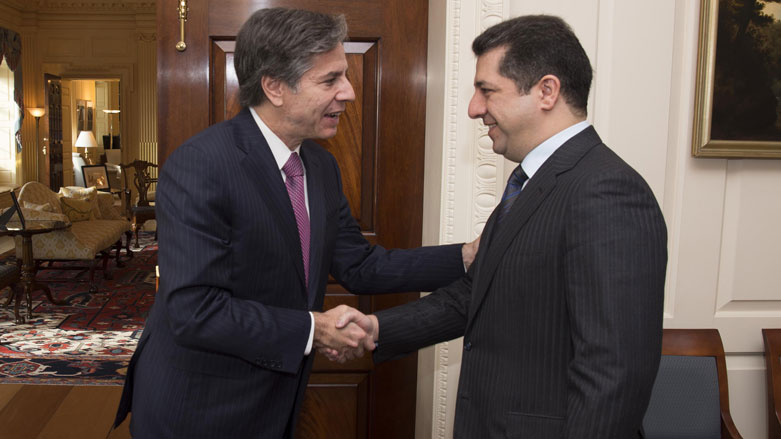EXCLUSIVE: Washington officials’ remarks demonstrate strength of Kurdistan, US ties

ERBIL, Kurdistan Region (Kurdistan24) – In a set of meetings with the US State and Defense officials on Monday, the Chancellor of the Kurdistan Region Security Council (KRSC) Masrour Barzani discussed bilateral relations and more military and financial support for Kurdistan.
Barzani, accompanied by the Chief of Staff to the President of the Kurdistan Region Fuad Hussein and other Kurdish diplomats, met the US Deputy of State Antony Blinken in Washington, DC.
Good meeting w/ @ABlinken to reaffirm longstanding Kurdistan-U.S. relationship and discuss post-IS political & security challenges in Iraq. pic.twitter.com/tmjEKvJ24W
— Masrour Barzani (@masrour_barzani) December 5, 2016
Blinken said the US was committed to working closely with the Kurdistan Regional Government (KRG) and would continue the dialogue about post-Islamic State (IS) support, including logistic, counter-terrorism, and capacity building to deal with future threats, according to the Kurdistan24 correspondent in Washington.
Peshmerga forces have made “extraordinary sacrifices” in the battle against the extremist group, he told Barzani.

[The Chancellor of the Kurdistan Region Security Council (KRSC) Masrour Barzani met the US Deputy of State Antony Blinken in Washington, DC., Dec 5, 2016. (Photo: KRG)]
In the past few years, the Kurdish forces have proven to be one of the most efficient ground forces in defeating IS.
The Kurdistan Region has also sheltered nearly 1.8 million Internally Displaced Persons (IDPs) and refugees fleeing from parts of Iraq and Syria.
“We deeply, deeply appreciate the remarkable aid [from the Kurdistan Region to the refugees and IDPs],” the US Deputy of State told Barzani.
Regarding the Mosul military operation, Blinken emphasized the importance of addressing the governance issue in Nineveh Province to prevent the emergence of similar extremist groups in the future.
Speaking of the new US administration, Blinken noted, “My hope and expectation is that the next administration will continue to support the Kurdistan Region.”
“We’ve got too much blood and treasure invested in this relationship,” he added.
Chancellor Barzani praised the support of the US to the Region and Peshmerga forces.
Moreover, he called on Washington to support the peaceful dialogue between Erbil and Baghdad about future relations.
He also said Kurdistan would continue to fight IS and remain a partner in the war on international terrorism regardless of the political developments.
The future of the ethnic and religious groups in Nineveh post-IS was another point of discussion Barzani highlighted in the meeting.
Moreover, the KRSC Chancellor also met Elissa Slotkin, the acting Assistant Secretary of Defense for International Security Affairs.
In meetings w/ @StateDept & @DeptofDefense, I thanked US Govt for its support to Kurdistan in war on IS & called for more aid to Peshmerga. pic.twitter.com/e3S05Ro2oE
— Masrour Barzani (@masrour_barzani) December 6, 2016
“You [Kurdistan Region] are an invaluable partner,” she told the Kurdish delegates. “We cannot do this without you. We value the relationship with you.”
Additionally, Barzani called for the continuation of the memorandum of understanding to assist Peshmerga forces which was signed in mid-July 2016 between Erbil and Washington.

[Meeting between the KRG delegation and Elissa Slotkin, the acting Assistant Secretary of Defense for International Security Affairs, Dec 5, 2016. (Photo: KRG)]
The Kurdish delegation also met Jonathan Cohen, the Deputy Assistant Secretary for European and Eurasian Affairs, and discussed the Mosul offensive.
Barzani mentioned IS had used desperate tactics to slow down the Iraqi forces advances by using booby traps, tunnels, and sending vehicles laden with explosives.
He acknowledged the coordination between Peshmerga and Iraqi security forces had been better than expected as it was the first time the two forces cooperated in a battle since Iraq’s liberation in 2003.
The delegates also separately met Dr. Walid Phares, the Middle East adviser of the US President-elect Donald Trump.
Barzani is expected to attend and speak at numerous think-tanks in Washington, including at the Woodrow Wilson Center on Dec. 8 about governance and security in a post-IS Iraq. He will provide the perspective of the KRG on the liberation of Mosul, the future of governance in the region, and US engagement in Iraq.
Editing by Karzan Sulaivany
(Rahim Rashidi contributed to this report from Washington, DC)

.jpg)